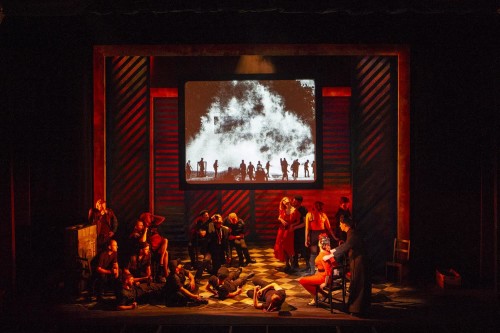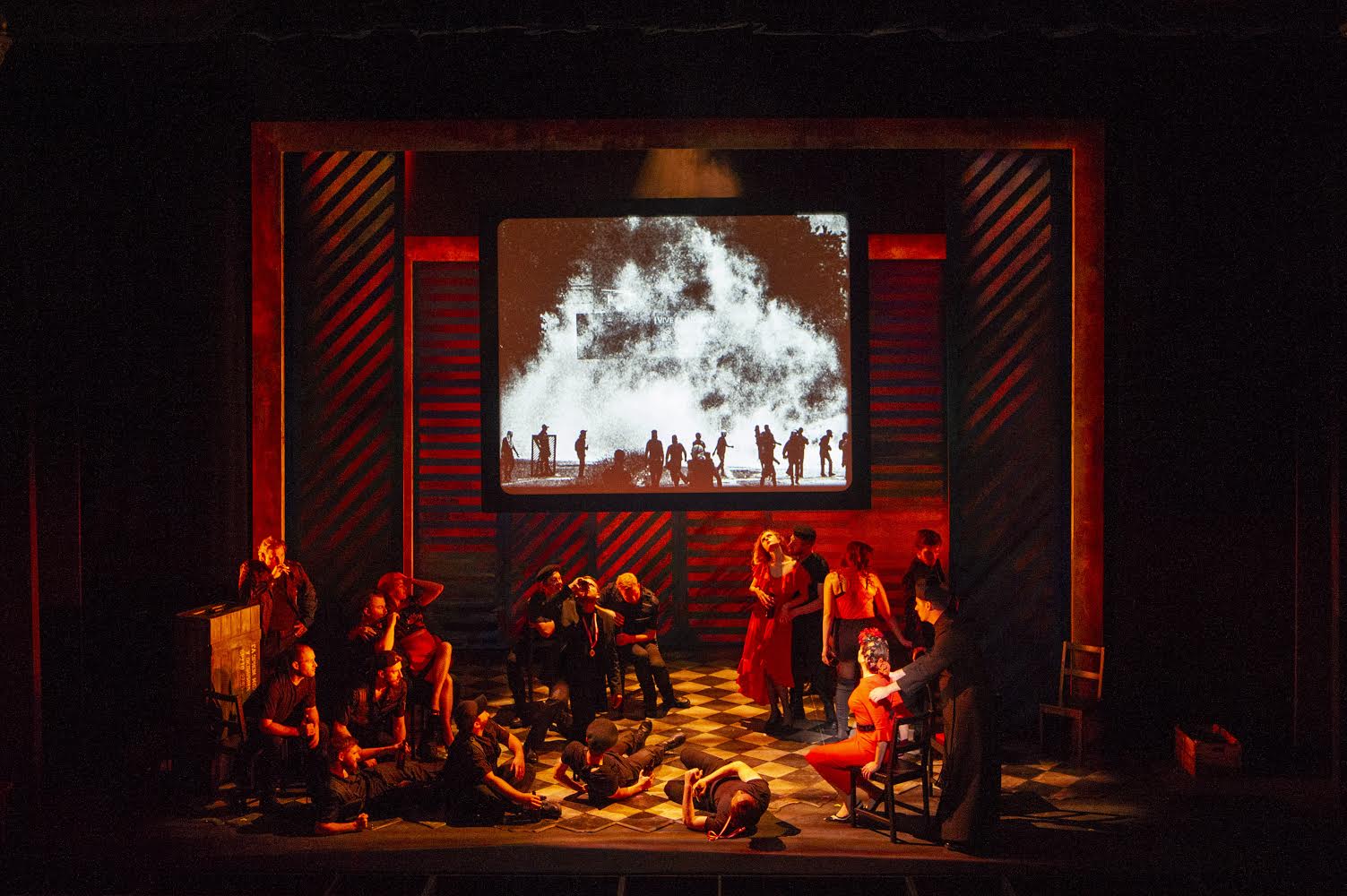
 United Kingdom 2018 Buxton International Festival – Verdi’s Alzira: Soloists, Buxton Festival Chorus, Northern Chamber Orchestra / Stephen Barlow (conductor). Opera House, Buxton, 7.7.2018. (RJF)
United Kingdom 2018 Buxton International Festival – Verdi’s Alzira: Soloists, Buxton Festival Chorus, Northern Chamber Orchestra / Stephen Barlow (conductor). Opera House, Buxton, 7.7.2018. (RJF)

Verdi – Alzira
Cast:
Alzira – Kate Ladner
Gusmano – James Cleverton
Zamoro – Jung Soo Yun
Alvaro – Graeme Danby
Ataliba – Phil Wilcox
Otumbo – Luke Sinclair
Ovando – Brian McNamee
Zuma – Helen Bailey
Production:
Director – Elijah Moshinsky
Designer – Russell Craig
Lighting Designer – Mark Jonathan
Verdi had conquered Milan, Rome and Venice when he received an invitation to write for the San Carlo at Naples. The theatre still carried the imprimatur and character imbued in it by the formidable impresario Domenico Barbaja who had drawn Rossini to the city to become the music director of the Royal Theatres. Verdi was also drawn to working with the theatre librettist Salvatore Cammarano, widely accepted as the best in the business following the retirement of Romani and who had earlier written the libretti for Donizetti’s successful Lucia di Lammermoor and Roberto Devereux. The drawback was that the commission came during the most hectic period of what Verdi called his anni di galera (years in the galleys), when his schedule of new works and revivals took its toll on the composer’s fragile health and psyche. In fact he had a breakdown and asked for a postponement of the premiere, submitting medical certificates in support. The impresario, Vincenzo Flauto, himself a doctor, at first dismissed his pleas suggesting the warm air of Naples would affect a speedy cure. With Cammarano’s aid a postponement was achieved and Alzira, Verdi’s eighth opera, was premiered on 12 August 1845.
The story of Alzira was derived from a five-act play by Voltaire, Alzire ou les Américains that Verdi had read. It was not his choice, but he did not demure believing that Cammarano would work its largely philosophical text into an opera he could set to music. Cammarano’s libretto reduced Voltaire’s five-act play to a prologue and two acts, a total of six scenes and is set against the backdrop of fighting between the Incas and the Spanish conquistadors in Peru. Alzira, the daughter of the Peruvian leader Ataliba is in love with Inca warrior Zamoro, but, in a political move, is promised to Gusmano the tyrannical son of the former Spanish Governor, Alvaro. The plot became a love triangle for tenor soprano and baritone.
Verdi is said to have composed the music in twenty days, for him a barely believable time scale. The opera was only moderately received in Naples and was a failure when revived in Rome in the November following its premiere. A revival at La Scala in 1846 earned Verdi his worst notices since the fiasco of Un giorno di regno. In later years the composer is said to have recognised Alzira’s limitations and considered it beyond redemption. It was lost sight of until revived in a production in Rome in 1967 that indicated the score to be at least vibrant and melodic in parts.
The rarity of productions meant that this was the British premiere of the work, surely such being the meat of the likes of Buxton’s International Festival. It was the third of a trilogy of Verdi operas staged by director Elijah Moshinsky, the previous being the original 1847 version of Macbeth last year (review) and Giovanna D’Arco in 2015 (review). If it was the least successful this might be the result of the updating to the mid twentieth century with rifle toting, panama hatted, rebels and the like allowing little of the story to emerge in the picture on the stage, albeit the lighting was often imaginative.
The singing was also variable. Outstanding was that of tenor Jung Soo Yun as Zamoro. His sung and acted intensity was a great leap forward from even his admired performance in last year’s Macbeth. If he can bring such vocal and acted skill to larger theatres he will soon have a burgeoning career. As Gusamo, his rival for the love of Alzira, baritone James Cleverton looked out of place in formal suit, which only served to isolate him from the story. His singing was also more formal than intense. He uses his somewhat lean baritone to give clarity, but little emotion. None the less, despite not have the sonority of the classic Verdi baritone, his clear diction and variety of vocal intensity were a big plus, I shall look out for him in the future. As his father Alvaro, Graeme Danby acted his role well. Of the minor male parts it was good to see RNCM student Brian McNamee making an impact on the professional stage. In the female lead role, and participant in both the earlier venture in the Buxton Verdi trilogy staged by Elijah Moshinsky, Kate Ladner is not vocally ideal, the tessitura laying high for her from time to time. However, she knows how to act and be involved in the drama of the story and she was otherwise particularly convincing.
The drama of this work is also in the music. I know the work from the 2001 CD set conducted by Fabio Luisi (Philips 464-628-20) and from the Unitel Classics DVD in their erroneously titled Tutto Verdi series of films of live performances of twenty six titles, but who were unable to find a performance to film and resorted to a concert performance (review). As I listened to Stephen Barlow’s well paced and idiomatic conducting I learned anew that this was no rum-ti-tum and vibrant choruses of much early Verdi. My thoughts wondered to Luisa Miller, Verdi’s fifteenth title, performed at the 2010 Buxton Festival, conducted idiomatically by Arthur Greenwood (review) and, dare I suggest, onto moments of Don Carlos, particularly the first version in French, not the shorter and harsher Italian version of 1884. It was the only opera the composer wrote and staged between Giovanni d’Arco (February 1845) and Attila (March 1846). Verdi himself was harsh in later life about Alzira, suffice to say – in my opinion – it is no second-class composition that its neglect implies. It was no years in the galleys period work Verdi often referred to in respect of his works prior to the great middle period trio of Rigoletto (March 1851), Il trovatore (January 1853) and La traviata (March 1853), referring to the pace at which he often was called upon to meet.
Robert J Farr
For more about the Buxton International Festival click here.

Who holds the copyright for Alzira? I was disappointed to find that there is no recording of the production in July 2018 at the BIF for copyright reasons – I would have loved to purchase the DVD of that production to complete my Verdi collection.